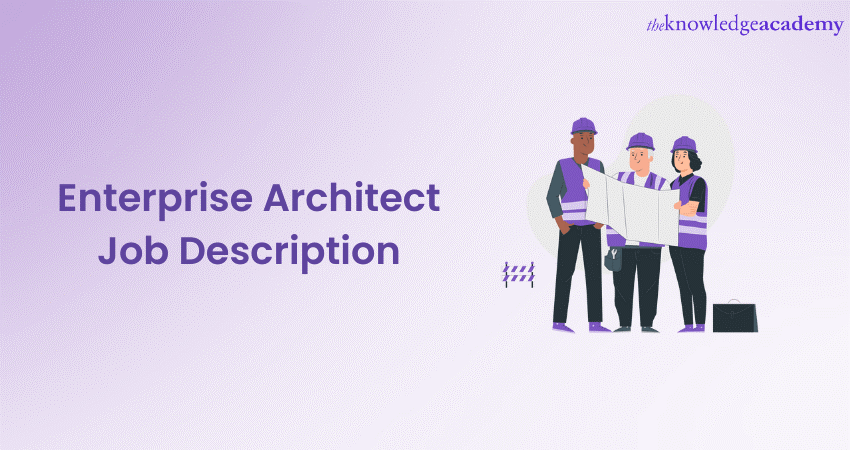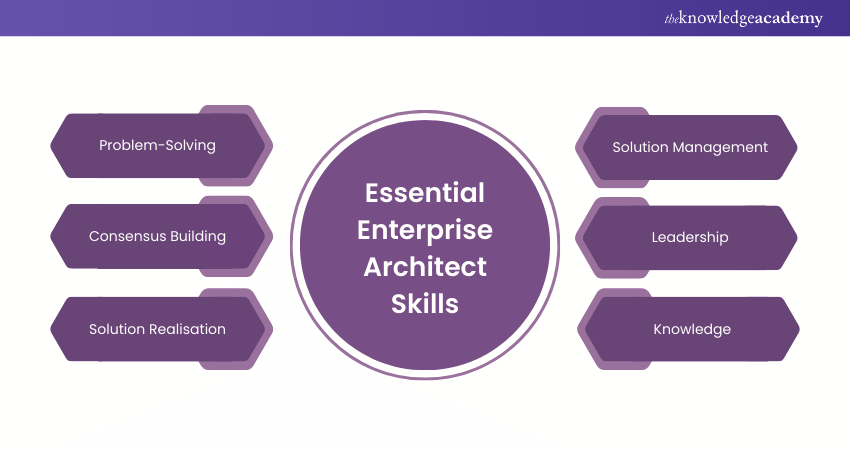We may not have the course you’re looking for. If you enquire or give us a call on +918037244591 and speak to our training experts, we may still be able to help with your training requirements.
We ensure quality, budget-alignment, and timely delivery by our expert instructors.

Ever wondered what it takes to become an Enterprise Architect? This pivotal role is all about crafting the strategic framework that sparks innovation and drives business success. In this comprehensive blog, we’ll delve into the “Enterprise Architect Job Description” to give you a clear understanding of the essential skills and qualifications needed for this career.
By examining a detailed “Enterprise Architect Job Description,” you’ll discover what employers are seeking and how to position yourself as a top candidate. Ready to explore what makes an Enterprise Architect a key player in the tech-driven world? Let’s dive in!
Table of Contents
1) Who is an Enterprise Architect?
2) Roles and Responsibilities of an Enterprise Architect
3) Education and Experience Requirements for an Enterprise Architect
4) Essential Enterprise Architect Skills
5) Enterprise Architect Salary Expectations
6) Enterprise Architect Job Description Template
7) Conclusion
Who is an Enterprise Architect?
An Enterprise Architect designs and oversees IT infrastructure to ensure alignment with an organisation’s business goals and strategies. They analyse the current systems architecture, identify areas for improvement, and develop comprehensive plans to integrate new technologies and processes.
The Enterprise Architect role involves creating roadmaps, setting standards, and ensuring the interoperability of systems across the enterprise. Similarly, the Business Architect role focuses on aligning business strategies with processes and technologies, ensuring cohesive business transformation. Enterprise Architects collaborate with stakeholders to understand business needs, manage risks, and ensure the efficient use of resources. Their work is crucial in enhancing organisational agility, improving performance, and supporting digital transformation initiatives.
Roles and Responsibilities of an Enterprise Architect
Let’s explore the roles related to Enterprise Architecture. These roles play an important role in shaping an organisation’s architecture and ensuring its alignment with business goals.

1) Enterprise Architect:
a) Responsible for envisioning, communicating, and evolving the organisation’s Enterprise Architecture.
b) Addresses various aspects, including organisational structure, business processes, value streams, data, information, and supporting technologies.
c) Focuses on how these elements fit together and evolve over time.
2) Chief Enterprise Architect (Chief EA):
a) Leads the Enterprise Architecture team.
b) Typically, an experienced enterprise architect with additional leadership responsibilities.
3) Architecture Owner (AO):
a) Guides solution delivery teams in architecture and solutions decisions.
b) Works closely with enterprise architects and may even hold both roles.
c) Often referred to as agile solution architects or agile architects.
4) Chief Architecture Owner (CAO):
a) Operates at the program level, leading architecture efforts across a program.
b) Typically, a senior AO has leadership responsibilities.
c) Collaborates closely with EAs and may also be an EA.
5) Specialised Architect:
A “meta role” for architects who specialise in specific aspects of Enterprise Architecture.
Examples include:
a) Business Architect: Focuses on organisational business processes, aligning business strategy with value streams, and organisational structure.
b) Information/Data Architect: Deals with artificial intelligence (AI), data/information security, flows, and enterprise data.
c) Domain Architect: Specialised in a specific business domain (e.g., brokerage or hydrology).
d) Infrastructure Architect: Handles IT network, physical equipment, infrastructure, and robotics.
e) IT Architect: Covers AI, data, IT network/systems, security, robotics, and system integration.
f) Network Architect: Expertise in cloud-based computing, IT systems, and telecommunications.
g) Product/Service Architect: Focuses on a single product or service.
h) Security Architect: Deals with cyber/info security and physical security.
i) Value Stream Architect: Addresses all aspects of a value stream and process flow.
j) Web Architect: Specialises in system integration and user experience
Join our Certified Enterprise Architect Professional (CEAP) Training – book your spot now!
Education and Experience Requirements for an Enterprise Architect
To Become an Enterprise Architect , a combination of education and experience is essential. Here are the typical qualifications:
1) Experience: At least seven years of analysis experience is expected.
Knowledge in at least one aspect of the business (e.g., engineering, manufacturing, planning) is crucial.
2) Education: A Bachelor's or Master's degree in Computer Science, Information Technology (IT), or a related field provides a solid foundation.
3) Certifications: Relevant certifications demonstrate competency and expertise in the field.
Essential Enterprise Architect Skills
The role of an enterprise architect demands a combination of soft and hard skills. Let’s explore the Enterprise Architect Skills in more detail:

1) Problem-solving:
a) EAs must identify critical issues and understand the variables affecting their resolution.
b) They devise effective solutions by analysing technical aspects, troubleshooting, researching, evaluating options, and communicating recommendations.
2) Consensus Building:
a) EAs engage with stakeholders to reach agreement on problems and solutions.
b) Strong verbal and written communication skills are essential for resolving conflicts and aligning perspectives.
3) Solution Realisation:
a) EAs play a key role in turning proposed solutions into reality.
b) This involves overseeing development, testing, and deployment processes.
4) Solution Management:
a) Managing the entire lifecycle of a solution is crucial.
b) EAs ensure that solutions remain effective and evolve as needed.
5) Leadership:
a) Effective leadership empowers employees and IT teams to stay focused and meet deadlines.
b) EAs guide teams toward architectural goals.
6) Knowledge:
a) Fluency in solution architecture frameworks, patterns, and best practices is essential.
b) EAs drive business transformation by applying this knowledge.
Become an expert in seamless system integration by joining our Enterprise Integration Practitioner Course now!
Enterprise Architect Salary Expectations
Understanding the salary expectations for an Enterprise Architect is crucial for both job seekers and employers. Below is a detailed explanation of the Enterprise Architect salary expectations:
|
Experience Level |
Estimated Salary Range (GBP) |
|
Entry-level (0-2 years) |
£45,000 - £60,000 |
|
Junior (2-5 years) |
£60,000 - £75,000 |
|
Mid-Level (5-10 years) |
£75,000 - £90,000 |
|
Senior (10-15 years) |
£90,000 - £110,000 |
Source: Glassdoor
Enterprise Architect Job Description Template
Below is a comprehensive example of job descriptions for Enterprise Architects. Use this as a reference to understand what employers typically seek in candidates and to customise your own applications.
|
Job Title: Enterprise Architect Location: London, UK Salary: £70,159 - £75,000 Job Overview: We are looking for an experienced Enterprise Architect to shape our organisation’s technology architecture. You will ensure alignment between IT infrastructure and business objectives, driving efficiency, scalability, and innovation. This position involves working closely with stakeholders to build solutions that meet both current and future needs. Key Responsibilities: a) Develop and implement Enterprise Architecture strategies b) Collaborate with stakeholders to align technology solutions with business goals c) Create a technology roadmap ensuring system scalability and flexibility d) Oversee systems integration and recommend future improvements e) Ensure governance, compliance, and risk management in architectural processes. f) Stay updated on emerging technologies and recommend innovations Skills & Qualifications: a) Education: Bachelor’s degree in Computer Science, IT, or related field; Master’s preferred. b) Experience: [X] years in Enterprise Architecture or IT infrastructure. c) Certifications: TOGAF, AWS Solutions Architect, or similar. d) Technical Proficiency: Familiarity with Architecture Frameworks, Cloud Technologies, and Cyber Security practices. e) Skills: Strong analytical and communication skills with leadership experience Benefits: Healthcare Insurance, Paid Holidays How to Apply? Send your CV and cover letter to [Insert Contact Information] |
Conclusion
In summary, becoming an Enterprise Architect means playing a key role in shaping an organisation’s future. By understanding the Enterprise Architect Job Description and preparing with Enterprise Architect Interview Questions, you can better equip yourself to meet the demands of this exciting career. Whether you’re looking to boost your current skills or start fresh, knowing what employers want will help you stand out. Ready to step into a role that drives innovation and success? The future of Enterprise Architecture is waiting for you!
Stay ahead in the competitive Information Technology (IT) landscape – sign up for our Enterprise Integration Advanced Course.
Frequently Asked Questions
What is the Difference Between an Enterprise Architect and an IT Business Analyst?

An Enterprise Architect designs and oversees the IT infrastructure to align with business goals, focusing on the big picture. An IT Business Analyst, however, identifies business needs and develops solutions, focusing on specific projects and processes.
What are the Different Types of Enterprise Architect?

Different types of Enterprise Architects are:
a) Business Architects
b) Information/Data Architects
c) Domain Architects
d) Infrastructure Architects
e) IT Architects
f) Network Architects
g) Product/Service Architects
h) Security Architects
i) Web Architects
What are the Other Resources and Offers Provided by The Knowledge Academy?

The Knowledge Academy takes global learning to new heights, offering over 3,000 online courses across 490+ locations in 190+ countries. This expansive reach ensures accessibility and convenience for learners worldwide.
Alongside our diverse Online Course Catalogue, encompassing 19 major categories, we go the extra mile by providing a plethora of free educational Online Resources like News updates, Blogs, videos, webinars, and interview questions. Tailoring learning experiences further, professionals can maximise value with customisable Course Bundles of TKA.
What is the Knowledge Pass, and How Does it Work?

The Knowledge Academy’s Knowledge Pass, a prepaid voucher, adds another layer of flexibility, allowing course bookings over a 12-month period. Join us on a journey where education knows no bounds.
What are the Related Courses and Blogs Provided by The Knowledge Academy?

The Knowledge Academy offers various Enterprise Architect Training, including Certified Enterprise Architect Professional (CEAP), Enterprise Architecture Black Belt and Enterprise Architecture Green Belt. These courses cater to different skill levels, providing comprehensive insights into Enterprise Architecture Guiding Principles.
Our Business Improvement Blogs cover a range of topics related to Enterprise Architect, offering valuable resources, best practices, and industry insights. Whether you are a beginner or looking to advance your Business skills, The Knowledge Academy's diverse courses and informative blogs have you covered.
Upcoming Business Improvement Resources Batches & Dates
Date
 Certified Enterprise Architect Professional (CEAP)
Certified Enterprise Architect Professional (CEAP)
Thu 15th May 2025
Thu 31st Jul 2025
Thu 30th Oct 2025






 Top Rated Course
Top Rated Course



 If you wish to make any changes to your course, please
If you wish to make any changes to your course, please


